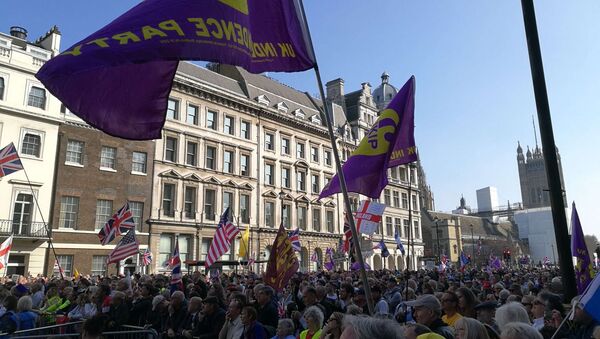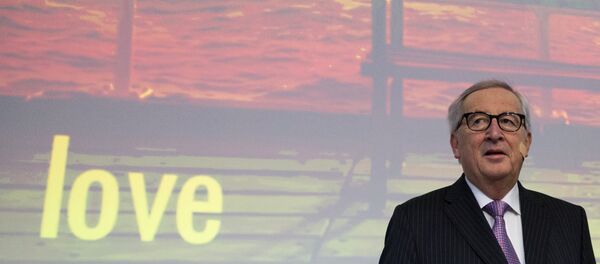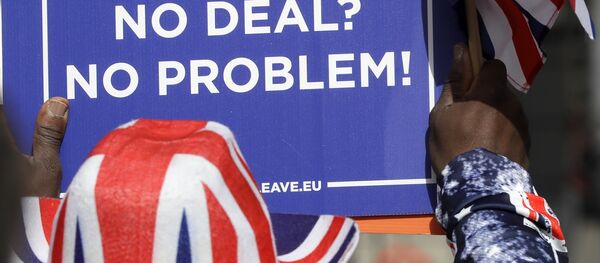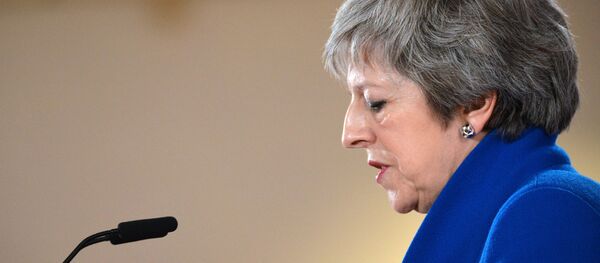MPs from all parties will test support for other options during a second round of "indicative votes" on Monday. According to the BBC, government sources haven't ruled out a run-off vote between whichever set-up proves most popular and the PM's Brexit plan.
Labour leader Jeremy Corbyn has called on Theresa May to change her deal or resign immediately. Northern Ireland's Democratic Unionist Party, which has provided May's conservatives with the coalition support needed to form a government, also continues to oppose the deal. The government has so far failed to win over 34 Conservative rebels, including both Remainers and Tory Brexiteers who say the deal still leaves the UK too closely aligned to Europe, the BBC says.
READ MORE: Tory MP Rees-Mogg's Sharing of AfD Leader's Brexit Speech Infuriates Twitter
We discussed this with Rodney Atkinson, author, political economist and former advisor to UK cabinet ministers.
Sputnik: Mrs May's deal has been rejected for the third time after we thought that it wouldn't even be put to a vote for the third time, do you think that a fourth time is realistic?
But it was defeated again, despite the weakness of so many previous opponents who seem to prefer the most disastrous deal of all rather than sticking to their principles. Then, of course, we've had these indicative votes, all of which showed there was no support at all for any of the other alternatives. Parliamentary motions mean nothing at all, the law stands at the moment as amended by the extension, that we leave on 12 April, so Brexit should go ahead on 12 April. A clean, clear Brexit was what the British people voted for.
Sputnik: But there are a lot of obstacles to that?
Rodney Atkinson: There's only an obstacle if the government can put down legislation for which they get a majority, but they don't seem from the indicative votes as if there's a majority for an alternative, therefore, the default option is to leave as they say without a deal, which is a complete nonsense of a description because the deal is quite clear, it's World Trade Organisation rules; we trade with the European Union as any other democratic sovereign nation.
READ MORE: Three Things EU Will Reportedly Ask of Britain to Close Brexit Deal
Sputnik: And yet many have said that to leave the European Union in the no deal, crashing out, disorderly fashion would be an absolute economic disaster…
Rodney Atkinson: But Mrs May's deal is crashing out. Mrs May's deal is not a deal at all, it's a complete surrender to permanent European Union control, except that we have no judges, no MEPs, no way of influencing what happens, we have no tariffs agreed, no fishing grounds back, we don't have our agriculture back, we don't get a trade agreement guaranteed with the European Union, we can't leave unless the EU permits it, we can't do trade agreements with other countries, and for all of this farce we're proposing to pay 40 billion pounds.
It's the worst treaty ever conceived since the Treaty of Versailles, but this so-called no deal really is a deal. It is simply straightforward, democratic sovereignty of the British people. If their government is not prepared for this then they are criminally irresponsible, although, we see from France, and Germany, and Spain, and other countries that preparations for the so-called no deal are made; British business seems to be prepared, we should just go ahead on 12 April.
Rodney Atkinson: No, in fact, there was a vote which said that if the alternative was to stay in or leave without a deal they would leave without a deal, there is no majority for staying in or for the May deal.
Sputnik: In the event of a so-called no deal exit what would happen with the Irish border?
Rodney Atkinson: The Irish border has always been a complete myth, a problem that's easily solved, goodwill on either side, and we see now that with a no deal the Irish government is in trouble, the European Union offering solutions, strange that they didn't offer solutions when they were negotiating with the UK government. Perhaps, this is what Mrs May called negotiating in good faith. There was absolutely no good faith between the European Union and the UK on the Irish problem.
READ MORE: EU May Delay Brexit For Second UK Referendum — Reports
Sputnik: The second round of indicative votes, what are your thoughts on the various options that exist, are any of them really palatable or conducive to creating a UK that's better off leaving through one of those options?
Rodney Atkinson: When we leave on 12 April with so-called no deal than first of all the immediate problems are already being solved, the interim problems, we can negotiate a trade deal; we were offered a Canada-style trade deal and Mrs May turned it down. There's plenty of room for civilised negotiations, but we've got to become a sovereign nation first. You can't negotiate from inside an organisation, the key to the door of which is held by the other side of the negotiations, they hold that power over you, you've got to be independent, then you have the power to negotiate on an equal basis and negotiating trade agreements is something we have to get used to again after 46 years of being inside a foreign corporation, a foreign country called the European Union, there's no shortage of countries around the world who want to and are at present doing trade deals with the UK.
One of Mrs May's proposals was that she would step down as Prime Minister, that she would resign if people voted for her ludicrous deal, that would've been a complete waste of time because once that deal is passed we are in a powerless position. One leading lawyer said that these negotiations were like a game of chess and it's not two halves of a football game, in a game of chess she has lost all the main pieces in the first half, and even the angel Gabriel himself couldn't negotiate on the basis of Mrs. May's deal, so getting rid of Mrs. May is neither here nor there, her deal is rotten to the core.
Sputnik: Do you see any prospects of a new round of elections?
Rodney Atkinson: I don't think so. I think both the Labour and Conservative parties come off so badly in these negotiations and people are so angry. 400 constituencies out of the 600 constituencies in this country voted to leave the European Union, so that majority of people in 400 constituencies are extremely angry, and I don't think either the Labour Party or the Conservative party would want to face the country again at the moment.
Sputnik: There have been assessments by the UK government, reports put out, about the impact of a no deal exit. Those government reports have actually said that it would be quite a disastrous result; it will be disastrous to the economy, the worst-hit areas would be Wales costing them 8.0% of GDP, Scotland, Northern Ireland and the North-East…
If it affects foreign car makers in this country, which it shouldn't do in the long run, then we will have a long time to accommodate that, but at the moment big businesses benefited from protection in the European bloc at the cost of consumers. Consumers will benefit enormously from the removal of high tariffs on food and clothes, and other matters which we now can set on our own, and I don't think the massive investment in our government by foreign companies like BMW, billions of pounds' worth in this country, they're not going to throw them away just because were not in the European Union; after all, they invest billions in the United States of America and they're not in the European Union.
READ MORE: Scholar Reveals What is the 'Tricky Thing' Ahead of Fourth Vote on Brexit Deal
Sputnik: But do you really believe that UK companies are prepared in earnest for a no deal scenario, do you think they have really prepared for what this could be on 12 April?
Rodney Atkinson: Civil servants tell us this, there have been leaks from inside the civil service that the civil services have managed to prepare well. We've heard business services saying the same thing, we've certainly had the City of London saying the same thing. Obviously, there will be immediate problems, but they can be solved, they can be arranged, you can come to agreements in the short-term and we can come to long-term trade agreements later. The important thing is, as I've said before, we have no power whatsoever if we sign the May deal, and therefore, we really will be victims. At least leaving without the so-called leave deal sets us free to not only negotiate but to conclude trade agreements around the world.
Sputnik: Do you believe that that would be a better option than extending the whole Brexit process?
Rodney Atkinson: Extending would be almost as bad as the May withdrawal agreement, it leaves everything up in the air, it leaves us to continue to be open to legislation and control by the European Union. Anyways, so many people have now prepared for leave that they're actually complaining that they can't get on with it.
Sputnik: So why in your view has this entire Brexit process has been so complicated, do you think the EU is really responsible for this, have they not negotiated in good faith?
We also in Britain had a government which was not a leave government, all the major offices of state were held by remainders, the Home Office, the Chancellor Exchequer and the Prime Minister, and so they naturally produced a remainder leave instead of a leave-leave. May was undoubtedly the weakest Prime Minister in our history at one of the most dangerous times in our history. She actually succeeded a negotiating a deal which left us worse off than we were before we started negotiating, and that's quite an achievement.
And of course, she was negotiating not with her fellow elected democratic leaders of other countries in Europe, she was negotiating with unelected bureaucrats who like a bulldozer just keep going forward feeling no personal effect to their own careers by seeking to dictate terms. Barnier himself said, and this is extremely important, at the very beginning of the negotiations, that he would've succeeded if he negotiated a Brexit deal worse than staying in, and that's exactly what he was able to do because May allowed him to do it.
The views and opinions expressed by the speaker do not necessarily reflect those of Sputnik.







